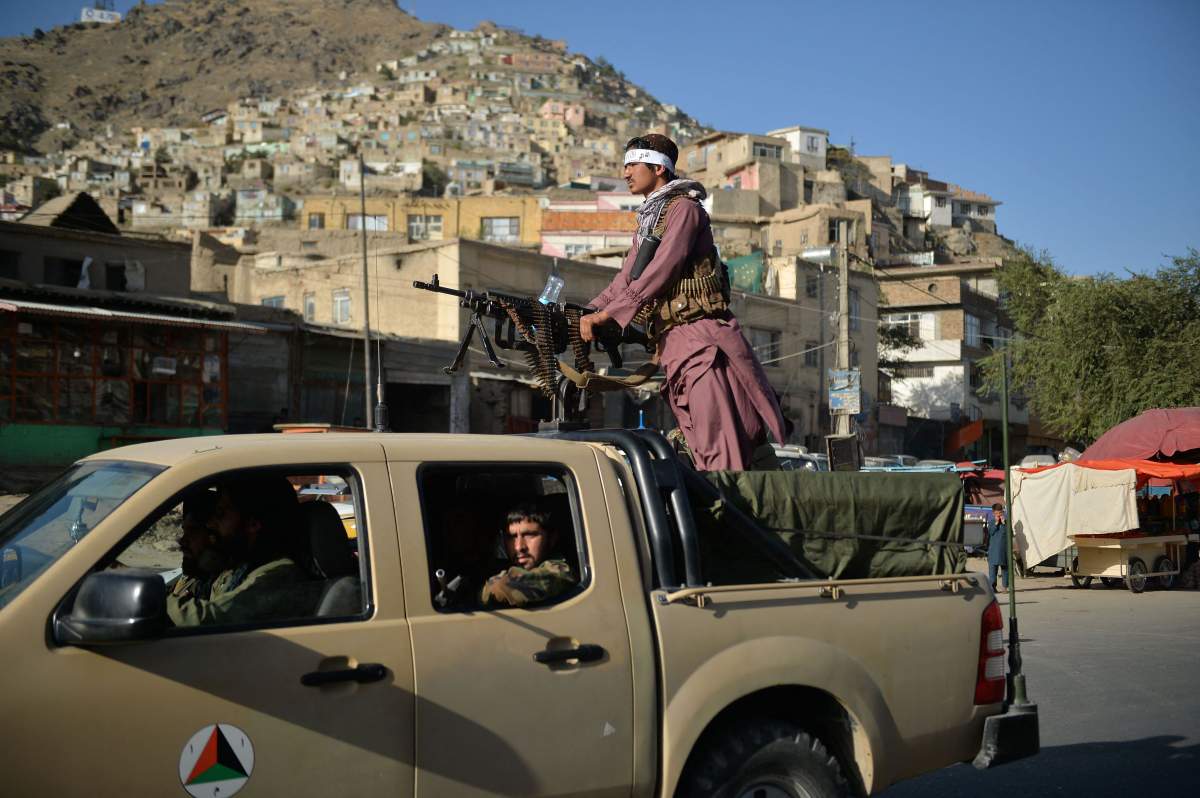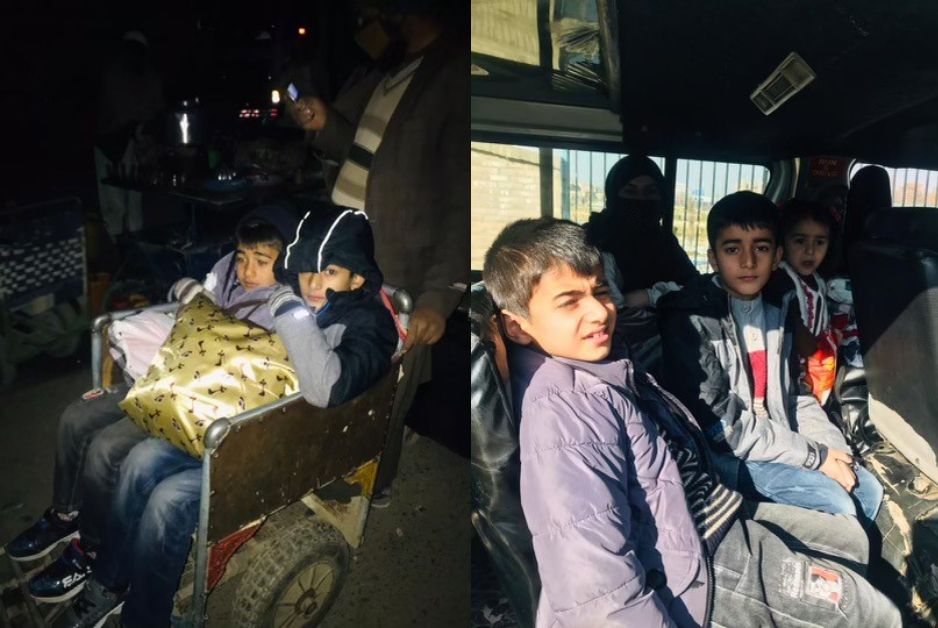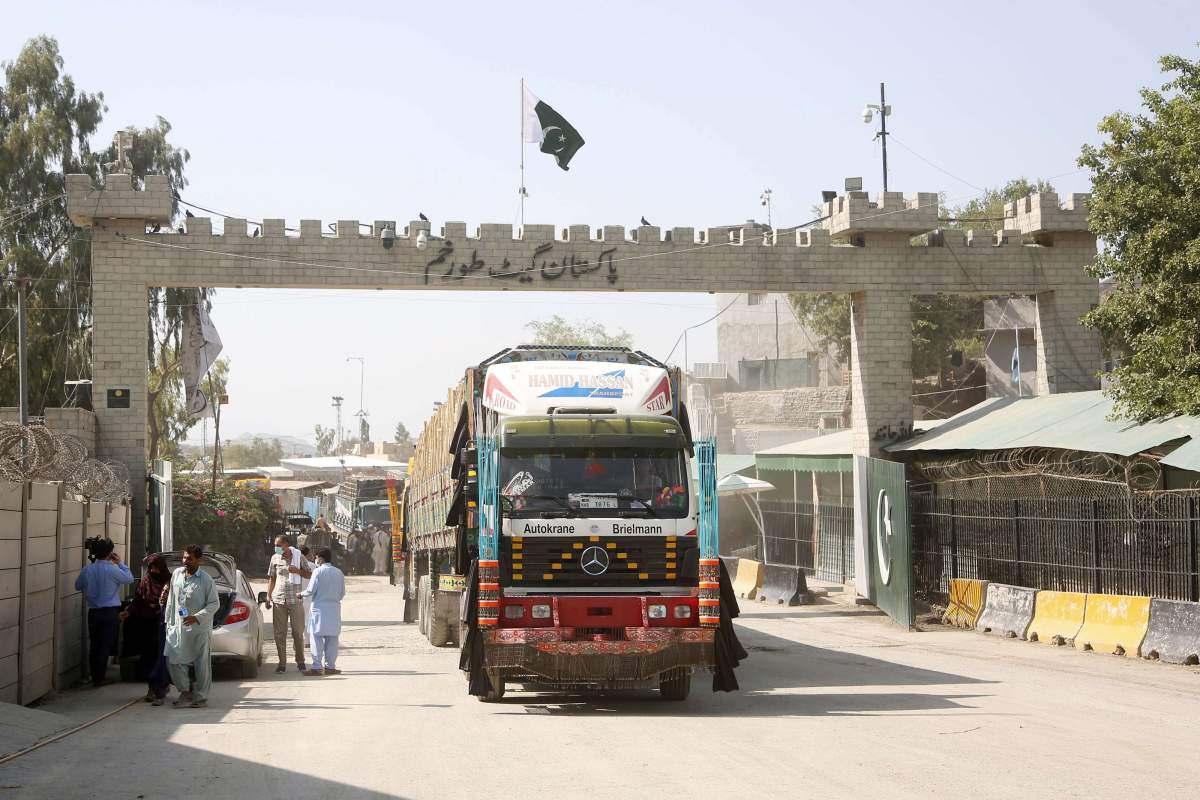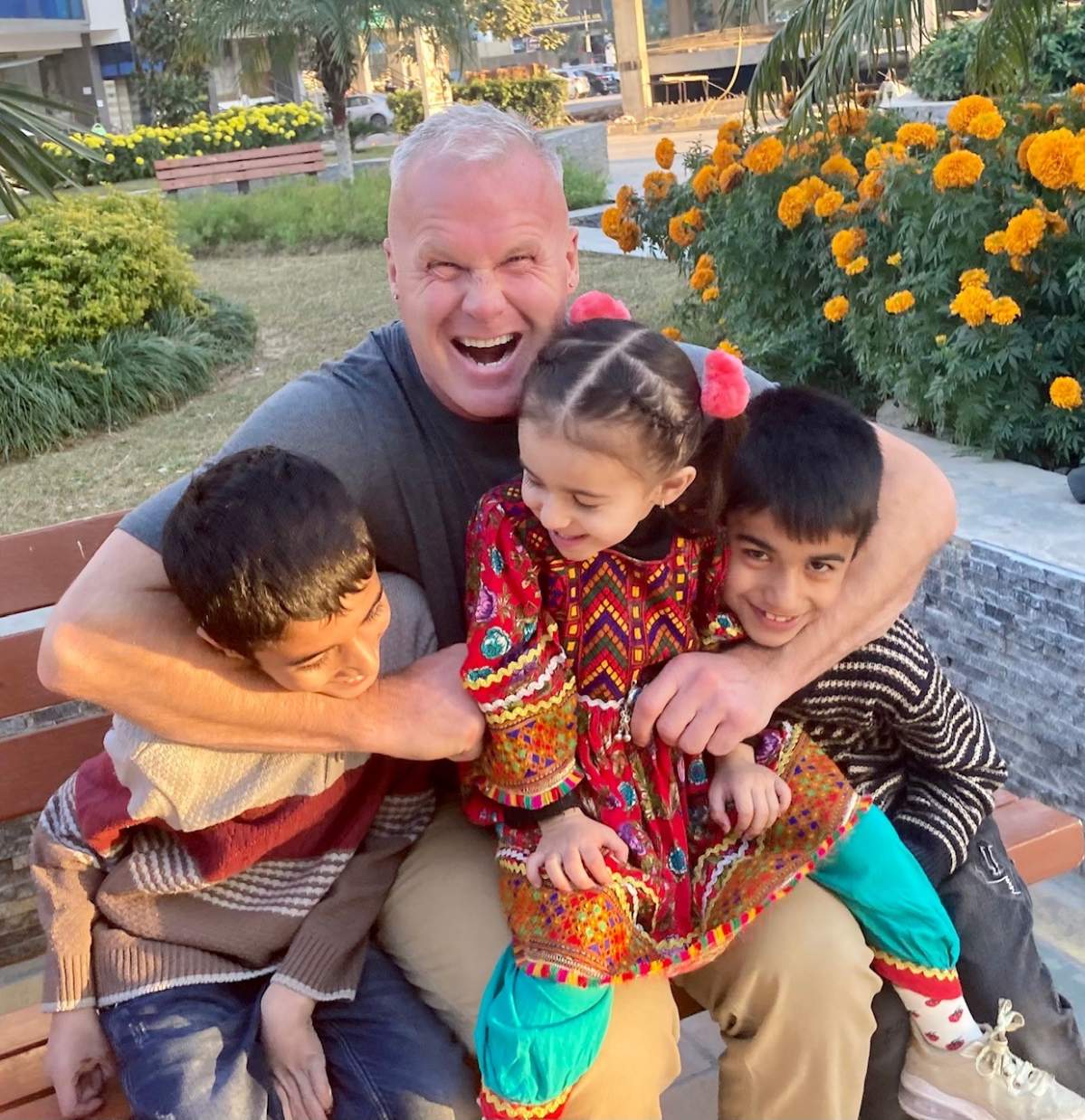Spencer Sekyer can finally breathe easy.

While scores of people in Afghanistan are still trying to flee their war-torn country, months after it was taken back by terrorists, one family has escaped to Pakistan thanks to the global efforts of the Alberta man.
Sekyer lives in the Edmonton area and is recently retired from being an educator. But in 2010, he spent his summer break teaching at a school in Kabul.
“Worked with some really wonderful Afghan teachers and people there and had just kept in touch with them over the years,” Sekyer said from Pakistan, where he spoke on the phone with 630 CHED’s J’lyn Nye.
He worked for Aschiana, a program helps vulnerable street children and their families in Kabul, in part by providing education. That’s where Sekyer met Naveed and his wife, Mashala, who is also a teacher.
At the time, Naveed was the school’s finance manager but Sekyer said in the decade since had obtained his law degree and was working as a human rights lawyer, advocating for children and women’s rights in Afghanistan.
That put a target on his back.
Family’s first attempt to flee the Taliban
As the western-backed Afghanistan government began to lose power and collapse amid a U.S. Military withdrawal earlier this year, the family began receiving death threats from the Taliban.
Mashala was also attacked by a member of the terrorist group, who threw boiling water on her face when she was leaving the school where they educated girls.
Work began to get the family out of Afghanistan. Sekyer said his friend reached out on social media.
“Naveed actually reached out to me before Kabul fell, and said, ‘Can (you) help us get out of here?’ and I said, ‘Absolutely, no question.'”
The efforts intensified when the Taliban swept into power at a breakneck pace in August, overrunning the Afghan government in a matter of days.
“We were already in the process when Kabul was falling,” Sekyer said.
“Kabul fell so quickly. I don’t think anyone was expecting it to go that quick.”
Sekyer tried to get the family in contact with Canadian immigration officials, but didn’t hear back so he turned to the Americans.
When he returned from Afghanistan in 2010, Sekyer brought some stray dogs back as well — which led to maintaining contact with people involved in animal rescue in Kabul. He used those contacts to get the ball rolling.
“It was just one of those things where, you know someone who knows someone,” he said, explaining his contact knew a U.S. State Department official.
Through them, Sekyer said he was able to get the couple and their three young children visas to enter the United States.
“We had the American P1 Visa status within probably a day, so that was a huge shot in the arm and that kind of pushed us forward. So when Kabul started to fall, we had an opportunity to get them out to the Americans.
“That was a hair-raising ordeal when that happened because all of Afghanistan had descended onto the airport, as we saw those horrific pictures.”

Sekyer said the family had priority status and was supposed to be on one of the many American transports out of the country in August.
They even waited for several days at the airport in Kabul — along with what seemed like every other desperate soul in Afghanistan.
“I think they they were camped out there for three days. Kids saw someone get shot right in front of them. It was just absolute bedlam,” he said.
Then, word came that there was going to be a bombing.
“The Americans, through intermediaries, contacted me. We knew those attacks were going to happen before they happened at the airport — the Americans knew.
“So the Pentagon contacted someone who contacted me and said, ‘Get those people out of there right now. Right now. The attack is imminent.'”

Get daily National news
The suicide bombing at the end of August was carried out by a single person at a gate to the airport, killing 13 U.S. troops and at least 79 Afghans.
The family was told to get at least 10 kilometres away from the airport, so they returned home to shelter in place.
What ensued was several failed attempts to get the family to safety.
Sekyer said there were efforts to help by the Pineapple Express — a group of ex-special forces military members who were in Afghanistan on their own privately funded journey to get people out.
The night of the airport attack, the group tried to get the family to the Americans, but they were overrun by the Taliban and had to turn around.

And then the wait began. Since the end of August, the family had been living in a safe house in Kabul — but Sekyer said remaining in hiding was not sustainable.
“I have a really difficult time just sitting around on my hands,” Sekyer said.
“You wait and you wait and you wait. And then I guess as kind of a personal mantra, ‘If this is not going to happen, let’s make it happen.'”
Sekyer takes matters into his own hands, travels to the Middle East
Frustrated with a lack of action from government officials, Sekyer travelled to Dubai in the United Arab Emirates, where he secured visas to enter Pakistan and Afghanistan.
With help from several contacts, he made his way to Kabul.
“It is so unbridled there. I’ve been to a lot of places like Somalia, the West Bank, Haiti, all sorts of places before — but I’ve never, ever been anywhere with this sort unpredictable, unbridled energy.
“You’ve got truckloads of Taliban: 12, 15 of them loaded in the back of a pickup truck, guns everywhere with masks on.”
Sekyer said Canadian officials knew what he was doing and were not pleased, but he was also told the Taliban didn’t want an international incident and he would likely be safe.
He ended up being escorted by machine-gun wielding Taliban members to his hotel.
“They were yelling really aggressively, but I guess what they were saying is, ‘We’re not going to hurt you,'” he said.
“They were claiming they just wanted to see me safely (to) the hotel, but not knowing that (at the time), it was a pretty terrifying experience, for sure.”
After arriving in Kabul, Sekyer worked to move the family to safety. Part of that process included a surreal experience at a restaurant where “the who’s who of the Taliban of Kabul” joined them for dinner.
“The whole rationale (was) to befriend them and to show them that you are trying to do good things. And I think that was kind of the purpose of the dinner — to get acquainted — but it was unlike any dinner I have ever had.
“You’re breaking bread with guys with machine guns between their legs. And then the whole restaurant was surrounded with guys with machine guns as well.”

Sekyer said some of the men at the dinner shared the life struggles that drove them to side with the Taliban: “It kind of gave a glimpse into sometimes what precipitated this sort of extremism.”
The perilous journey to escape Afghanistan
Last week, the family made the dangerous, 500-kilometre journey between Kabul to Islamabad, Pakistan. Sekyer saw the family off in the morning.
Sekyer said the trip with a hired driver between Kabul and Jalalabad in eastern Afghanistan was made during the day and uneventful, but the final leg of the journey is where things became much more perilous.
The highway between Jalalabad and the Torkham Gate border crossing into Pakistan is a dangerous 75-kilometre trek through mountainous and often lawless ISIS-controlled territory, Sekyer said.
For that reason, he couldn’t be with the family when they made that overnight journey.
“There’s lots of checkstops. They get stopped all the time,” Sekyer said.
“There comes a point where I would have become a liability because if we go to a checkstop and they see a white guy, it’s not going well for anybody. So I was advised like, ‘Look, you have to take one for the team and not make this journey.’
“You stand out so profoundly when you’re North American and you’re white.”
One of Afghanistan’s key border crossings with Pakistan, Torkham Gate has long been the busiest between the two countries.
After air traffic was suspended, Torkham became one of the few gateways out of Afghanistan.
But worsening security prompted authorities to clamp down on border movement, with an average of just 85 daily crossings in August at Torkham, against 7,000 to 8,000 in March and April.
“Certainly when this whole venture started, it was bedlam at the gate. There were people getting killed at the gate, suicide bombers at the gates, people getting shot at the gates. So it wasn’t for the lighthearted, for sure.”
“You’ve got basically an entire country trying to do a mass exodus — to all pour over into Pakistan is putting a lot of undue pressure on them as well.”
Sekyer said four months after the Taliban takeover, things at the border are beginning to normalize and those with proper documentation and visas have a better chance of crossing. But even that isn’t a guarantee.
It was through that dangerous region the parents and their three-, five- and six-year-old children made their way to safety.
“A lot of people may not understand: if you’re out of line here it’s not a tongue-lashing — you will get shot in the very literal sense. So it’s not for the faint of heart.
“I felt if they could make it through there, then I felt the chances were pretty good,” he added.
The family arrived at the border, where porters move people through the gate: “They’re kind of the people that know who is who, and can get people across. And I’m sure there are palms greased.”
What’s next for the family?
The family is now in a safehouse in Pakistan, applying for asylum in both Canada and the United States. That’s where Sekyer reunited with them a few days ago.
“We’re not totally out of the woods yet, but what I would say is we’re probably 75 per cent of the way there,” Sekyer said.
“So now comes the very unsexy part of trying to do the necessary paperwork to get them asylum and refugee status into Canada.”
Others have not been as lucky. Nazifa, a Grade 6 student, was killed the night of Dec. 10 when the Taliban opened fire on a vehicle that had passed through a checkpoint in Kandahar City.
Her father Bashir worked as a carpenter for the Canadian Forces until 2011. The family was approved to immigrate to Canada, but had been unable to leave Afghanistan because the government has halted evacuation efforts.
They were in Kandahar to apply for Afghan passports so they could attempt to travel to neighbouring Pakistan, and fly from there to Canada, when Nazifa was shot while returning from a wedding, her family said.

The killing has highlighted the plight of thousands of Afghans who are living in fear of the Taliban because their families worked for the Canadian Forces, but who have no way to flee.
Sekyer said a knot in his chest loosened when he got the text that the family had crossed the border into Pakistan, but then his attention turned to the next steps.
“Until we get them safe in Canada or the United States or some other safe country, this isn’t done.”
As of Monday, 3,800 Afghans have arrived in Canada under a program for those who had worked for the Canadian Forces or otherwise helped the government in Afghanistan.
Another 2,080 have arrived under a humanitarian program. But thousands remain in Afghanistan due to the suspension of evacuations, and border measures imposed by neighbouring countries.
“He is such a wonderful man,” Sekyer said of Naveed, who would like to bring his family to Canada. “He’s made friends with all the different nationalities that went and taught in Aschiana or were involved.”
Sekyer said Naveed has made friends with several Americans through their involvement with the Aschiana school, who are also advocating for the family to be accepted as refugees in their country as well.
“I told him whichever comes first — if he’s got an opportunity to resettle in the United States, it’s a wonderful place.”
Sekyer himself is now hoping to be back in Canada by the end of this week, in order to spend Christmas with his own family. He said he couldn’t have helped the family on his own.
“When something like this happens, there’s a whole network of people that you know, have come together that I can’t mention. It’s not like I did this all by myself.
“There’s a whole bunch of people that did this really amazing thing.”
A GoFundMe has been set up to help cover the family’s costs of relocation.

Editor’s Note: Global News has removed the family’s last name from this story after safety concerns were expressed.
— with files from Gibran Naiyyar Peshimam, Reuters and Stewart Bell and Jeff Semple, Global News















Comments
Want to discuss? Please read our Commenting Policy first.